page 2
~ The Study of Threes ~
http://threesology.org

Sane visitors as of 13 Jan 2020
| Age of Insanity 1 (circa 2020) |
Age of Insanity 2 (circa 2020) |
||
| IHV's page a | IHV's page b | IHV's page c | IHV's page d |
| IHV's page e | IHV's page f | IHV's page g | |
There are three main categories into which the hearing of talking voices often fall, but these three categories do not account for all types of (aural phenomena described as) auditory hallucinations:
- A person hearing a voice speak one's thoughts.
- A person hearing one or more voices arguing.
- A person hearing a voice narrating their own actions.
Again, it is necessary for the reader to make note that we of today, which includes the entire world of professionals, at least from the amount of material I have thus far surveyed, do not fully appreciate the aural phenomena presently described "mostly" in negative terms. There is virtually no account being given between the occurrence of aural phenomena and its role in altering social interactions on a national or international level, though personal sociabilities within and out of a family context may well be noted by trained or otherwise perceptive individuals. Even if, as described, that only 10 percent of the public experiences aural phenomena typically described as "hearing voices" (though from personal experience I have had multiple kinds such as hearing three knocks, hearing what sounds like a ball bearing being dropped on a shelf three times, etc., as well as feeling a "presence" nearby in a series of three presentations or representations...); the overall effects of these experiences on the public in overt, or covert or intermittent ways is not being particularized with a specific label. It can not be over-emphasized that humanity retains a primitive level of stupidity to go along with its child-like curiosity. Present day so-called professionals do not know everything. In fact, most, if not all, are fairly ignorant. And they know it. Many of them would be the first to tell you that while they are knowledgeable about a speciality, they remain considerably at a distance from grasping the realities of many singular subjects, much less a multi-discipline grasp of inter-activity.
While hearing voices can be a symptom of some types of mental health problems, hearing voices is actually quite a common experience and not everyone who hears voices has a mental health problem. Research estimates that around 10% of people have had an experience of hearing voices at some point in their lives.
Unfortunately, the "research" is wrong because the researchers undoubtedly use incorrect assumptions about what is to be included in their surveys and do not appreciate it in its many guises.
However the aural phenomena needs to be better categorized as a spectrum of behavioral possibility:
- Aural activity involving particularly sensitive auditory ability or otherwise those who are, for one reason or another "tune in" to a given frequency that
no one they have contact with may have or can understand what they may be feebly describing (because of age, lack of an articulate vocabulary, speech
impediment, shyness, overbearing parental figure, disallowed self expression, etc...).
- Some people have an "ear" for music while others claim themselves to be "tone deaf".
- Some people appear to have an uncanny ability to "visually" hear sounds within objects such as engines, etc..., that is, to physically feel (like a reptile whose jaw picks up vibrations and from which our inner bones originated: Evolution of mammalian auditory ossicles)
- Some people have brains which trigger recurrences of speechless or wordless sounds that are interpreted as being melodic.
- Auditory hallucinations created by incorrectly identified sounds, due to physical (psychiatric) or mental/emotional (psychological) impairments.
It is extremely irritating to encounter someone who writes about aural activity in terms of being an Hallucination defined as a false perception. Many, if not most of the perceptions being labeled an "hallucination" are real perceptions that may be misinterpreted or misrepresented, but they are actual occurrences. If we could account for all the misinterpretations and misrepresentations that take place in business, government and religion on a day-to-day basis by so-called professionals, the public might be shocked, unless it too is making the same mistakes and would therefore conclude such mistakes as some sort of normalcy... just as the burning of innocent people who were perceived to be witches.
Ten percent of the world's population of 7.5 billion people is 750 million. The reactions of 750 million people can have an impact on human society, particularly if a given social situation hosts a greater percentage of those having experiences of aural phenomena that are either misinterpreted and/or misrepresented. If we couple this to visual, tactile, odor and taste, imagine the world that is being created from what might otherwise be described as nonsense or fairy tales, or myth-creation. All of this makes conditions ripe for the creation of cults. Small ones, medium sized and large ones, as well as variations thereof.
But those having such experiences can not be easily recognized because the experiences are being masked by so-called norm and normalized activities which distract people and cause them to intermingle their experiences with perceptions and articulations expressed by others, especially those who have garnered attention and play some representative role model spokesperson. Socialization allows a person to define their experiences in such a way as to mimic or suggest they are going along with the views of one or more dominant persons. Different people use either personal or social ways in which to mask, diluted, or otherwise attempt to remove themselves from a perceived wrong, bad or incongruent-to-society perception. For example:
- Usage of a prescribed drug to maintain some level of less, or non-caring mindfulness/mindlessness.
- Usage of Headphones to drown out the reality from which they are reminded of that which is perceived as a bad influence.
- Usage of a job in which there is continuing noise to drown out other repetitions.
- Usage of alcohol to maintain some level of inebriation so that the senses are dulled and so-called "strange" or uncommon ideas (which others might define as creativity), can be excused by the usage of alcohol.
- Usage of a sport or dance activity to distract oneself from having to think an otherwise recurring thought.
- usage of deliberate bad behavior so as to sustain a given thought about being a bad person so that other recurring, repetitive thoughts are not allowed entry into consciousness.
- Instigating conditions which suggest some deep mystery to search for and thus distract oneself or contour so-called strange thoughts into the mix of deciphering alleged codes of a map legend that one is putting together from random sources.
- Self-admittance to a psychiatric facility where chemical restraints can be used and where the presence of others with shared experiences can provide some modicum of relief, since group-therapy sessions are like a cult headed by a (psychiatric; mind-controlling) "leader".
- Intentionally crafted distractions by way of work, daily routine, exercise schedules.
- Seeking out experiences which over-stimulate some other sensory channel than that which a defined "hallucinatory" experience is taking place or through.
- Engaging in some obsessive/compulsive activity as an attempt to shield oneself for "unwanted thoughts" (that are in many cases misinterpretations).
- Etc...
The fact that we of today pay witness to many disturbances of thinking taking place with business, government and religious leaders is very problematic, though many shrug off the idea by saying there is nothing they can do about it. And yet, a widespread production of the knowledge that an "Age of Irrationality" situation is occurring and that it should be addressed, is at least a beginning, though an actual socialized effort in addressing the issue may not be forth coming until many decades from now. For example. Let us say you are a teacher who is told a class of students are mentally ill, but that the mental illness is disguised in socially acceptable ways. Do you react differently than if you were not told this to the same group of students whom you assume are otherwise "normal" and will thus interpret any perceived "irregular" or "odd" occasion of behavior as being due to a person's age, such as they are immature, lack effective parental guidance or some other typical rationale found in an education setting? The point is, we are only addressing "gross" expressions of perceptual misinterpretations and misrepresentations by way of instructions meant to mimic accepted age-related standards of conduct, because society as a whole does not know what to do otherwise. If a student or individuals shows an "exceptional" (good or bad) behavior we may well invest more effort in them, while the perceived run-of-the-mill student is permitted to maintain their mediocrity, though they have a potential to be much better than they actually are. This potential, because it is not encouraged, is adapted by the person to be used to effect more efficiency to continue being rewarded as a "good" student or person because they are not expected to do otherwise.
Likewise, those who experience other-than-typical perceptions are being subjected to small and large social denunciations such as having them be routinely described as hallucinations. Whereas the perception they are having is real, it is being misinterpreted and/or mislabeled and/or incorrectly articulated either because a person lacks the appropriate vocabulary, or the vocabulary being used is a metaphor or analogy that those who are hearing the articulation are misunderstanding. Whereas in many cases a perception can be channeled into a creative expression by those who have been trained or learned on their own to adopt such perceptions this way, most people appear to apply their perceptions to the context and language which they are involved with, thus adding to a mix of convoluted ideation which creates conditions that may result in a widespread irrationality.
Whereas we have a means and methodology to deal with individualized cases of insanity, we do not have one to deal with larger group expressions thereof. Nor do we have a means to deal with insanity or some other disturbance of mind or affect when it occurs with a social leader, unless there is some gross display of conduct that those around them can not mollify or buffer. When a social leader is insane or incompetent, there is no reliable or readily available mechanism for removal if those around him or her use them as a figure head by which they can carry out their own interests. Indeed, how does one go about getting rid of an insane government or insane government organization such as a military? Or how about an insane security service that is well-armed? Or how about an established education system with millions of educators? Or an entire nation whose sanity can not be recovered?
In my own experiences with aural phenomena, I was a teenage driving one day and listening to the radio with all of a sudden the music disappeared, and only the words being sung were heard. I thought it was a problem with the radio so I switched to another station. When I again heard music I shrugged off the previous event until a short while later it occurred again... And then again... and then I couldn't hear music from a radio but I could hear a melody attached to words which I compiled into poetry. Needless to say, I am not a music listener today. In fact when the music disappeared those many years ago and I couldn't get anyone to believe me and without getting weird looks and negative comments, I stopped talking about it and listened to the "songs" without the music. I was surprised at how really stupid the expressions came across. Viewing the songs as the personal philosophies of the people singing made me realize how really silly and ignorant they were. Today, looking back at the interviews of those who were once thought to be "great" song writers, their ignorance can be more fully noted now that I have several decades of experience and education to assess them with.
However, let me also make mention of those who claim to hear music, in fact different stations of radio broadcasts after having braces or fillings put in. Yet, let us differentiate this from the phenomena of the Musical Ear Syndrome, to which the following comments may be of some interest:
When you were born, you did not know language (or anything else for that matter). Yes, you heard various sounds, but they were basically just a jumble of meaningless data when they arrived at your brain.
At this point, because your brain is a pattern recognition machine, it goes to work and begins searching this mass of data for patterns of sounds. Whenever it sees a recurring pattern, it catalogs these sounds and slowly you begin to understand language. At first it is very simple language—ma ma and da da. Then, as your brain gets better at it, your brain extracts more and more patterns of speech sounds and you begin to understand more complex language.
This pattern recognition continues all your life. Whenever you hear sounds, your brain tries to make sense of them by trying to match them to patterns already stored in its data base. Sometimes these sounds are meaningful, such as speech, and sometimes they are just random sounds without any intelligibility in them. But your brain doesn’t know this, so it searches these random sounds looking for patterns (intelligibility).
- The fancy Greek word used to describe searching for patterns in random data is called "apophenia" (ah-poe-FEE-nee-ah) from two Greek words "apo"—away from, and "phaenein"—to show. It basically means to see/hear something that is away from reality (i.e. not real). Thus apophenia is the experience of perceiving patterns (actually pseudo-patterns) in random, and thus meaningless, data (1)—in our examples, random auditory data.
- This brings us to the second Greek term–pareidolia (par-ih- DOE- lee-ah). Pareidolia comes from two Greek words "para"—wrong, and "eidolon"—image. Pareidolia is the neurological phenomenon of perceiving a pattern in random noise (data) where in reality there is no such pattern. In other words, pareidolia is a psychological phenomenon where you interpret a vague stimulus (in our example, fan noise) as something known to the observer (in this case, music). Thus you perceive this as something significant (real), when it is not really significant (real). It is not music, it is still just fan noise.
Pareidolia is actually the audiovisual form of apophenia—perceiving patterns within random data. Therefore, audio pareidolia is specifically looking for patterns within random sounds. Audio pareidolia is hearing words/music that are not actually in the sounds you are hearing. This can occur by misinterpreting words that are being said, or by hearing words in random noise. In audio pareidolia, your brain searches for a recognized pattern, finds the closest match, and then processes the incoming sensory information to enhance the apparent match.
Incidentally, a mondegreen (see Mondegreens and Hearing Loss) is a specific case of audio pareidolia. The core phenomenon is the subconscious searching for a best pattern fit for ambiguous sensory input. Sure, random noise is maximally ambiguous, but that does not mean that garbled or difficult-to-make-out lyrics cannot also qualify. This has occurred more often than you might care to remember if you have a hearing loss.
People with audio pareidolia (the second category of MES sounds) typically hear words or music when exposed to softer, constant background sounds such as fans or engines running. If there is just the suggestion of music or speech or singing in the sound, that is enough for our brains and off they go—finding the closest match to a recognized pattern. They then enhance, and even fill in, details to create the illusion of hearing a choir or orchestra or whatever.
When you don’t understand audio pareidolia, you can jump to some weird and even bizarre conclusions. This is because you fail to understand the nature of the human mind. Your brain can be fooled, and thus, you can be fooled. Here’s why:
- Your brain actively processes sensory input. It makes many assumptions and forces fits to recognized patterns.
- Your brain does not give a truly objective and accurate representation of the world
- Rather, it gives you a human view—one that is full of pattern recognition—sometimes real, sometimes forced.
As a result, sometimes certain constant external background sounds become the basis for perceiving speech and music. Examples of these sounds include jet plane noise; road/wind noise when riding in vehicles; fans and other motors; and running water. In addition, the incessant rattle of a train’s wheels clickety-clacking down the tracks may eventually also sound like rhythmic, illusory, repetitive phrases.
Apophenia, Audio Pareidolia and Musical Ear Syndromeby Neil Bauman, Ph.D., July 9, 2015
Let me provide another reference described as "Musicophilia" with means a love of or for music, and does not actually represent my previously stated experience, but he provides an example of a woman who born without an ability to hear music, though I was not, so while there is some similarity there also is a difference to be noted:

Oliver Sacks is a psychiatrist and neurologist best known for his collections of case histories from the far borderlands of neurological experience, The Man Who Mistook His Wife for a Hat and An Anthropologist on Mars, in which he describes patients struggling to live with conditions ranging from Tourette's syndrome to autism, parkinsonism, musical hallucination, epilepsy, phantom limb syndrome, schizophrenia, retardation, and Alzheimer's disease.
In 1966, Dr. Sacks began working as a consulting neurologist for Beth Abraham Hospital in the Bronx, a chronic care hospital where he encountered an extraordinary group of patients, many of whom had spent decades in strange, frozen states, like human statues, unable to initiate movement. He recognized these patients as survivors of the great pandemic of sleepy sickness that had swept the world from 1916 to 1927, and treated them with a then-experimental drug, L-dopa, which enabled them to come back to life. They became the subjects of his book Awakenings, which later inspired a play by Harold Pinter and the Oscar-nominated feature film called Awakenings.
In July of 2007, Sacks was appointed Professor of Neurology and Psychiatry at Columbia University Medical Center, and he was also designated the university's first Columbia University Artist. Sacks Latest book Musicophilia: Tales of Music and the Brain (2007), was has been Revised and Expanded in a new edition that was released in September of 2008.
→ Link to Oliver Sacks' discussion at the Big Think Website ←,
Here is another more lengthy discussion by Oliver Sacks in a youtube presentation:
Yes, untrained personal voices can sometimes cause people to do irrational activities, because there is no public education which guides them along the development of those voices. The voices, for some, remain as a feral child. They become and remain wild because the voices have critical developmental periods just like language and other skills of particularized sociability. Some voices develop their own personality which comes to permanently or intermittently adopt a controlling nature over someone, and thus the person appears to some as exhibiting one or more different personalities which may not show themselves unless subjected to a give environment. Whereas someone such as a psychologist may claim such a person to have an unstable personality, the person is actually exhibiting a behavioral capacity for adaptability to different conditions, though the personality which they exhibit may be an untrained adolescent, an innocently acting child who is scared, a boisterous individual attempting to overcompensate for some perceived short-coming or limitation, or any variety of characteristics seen in people who may not be as readily adaptable to a given situation. The "voices" are a developmental extension of a person which can provide a greater intelligibility of interpreting variously perceived phenomena, or can exhibit an irrationality because a person is confronted by a conflict by what is being heard from others and that heard by their "inner" voice.
Because we have a widespread medical profession whose members are competing for a list of clientele from whom they must secure an income, we have a situation which is not conducive to the best interests of the public. Very often, and I speak from personal experiences, I can tell you that not only medical professionals, but so-called automobile professionals, small engine professionals, landscaping professionals, dental professionals, political professionals, banking professionals, baking professionals, cooking professionals, sports professionals, music professionals, counseling professional, education professionals, martial arts and boxing professionals, Human Resource professionals, air plane flight professionals, military strategist professionals, legal professionals, security personnel professionals, given art, science and journalism professionals, construction professionals, electrical professionals, plumbing professionals, automotive sales professionals, realtor professionals, armament dealer professionals, explosive professionals, pharmacist professionals, illegal drug dealing professionals, corporate professionals and multiple others I have come into contact with due to having one employment position or another... all of them are engaged in subterfuges... that you might say are lies directed towards a means to secure as much money (or other advantage) from you as they can.
The current formula of Capitalism is extremely unhealthy for humanity, though I want to emphasize that "Capitalism" is not the enemy as some Communist and others might want to declare. Capitalism is just a tool. Like a gun, a drill, a vehicle, a roll of toilet paper, and other items being used on a daily basis. It is not the tool but the person who wields it. Presently, we have a banking and stock market system that is very unhealthy for the greater number of people inhabiting the planet, but the current formulas of Communism, Democracy and Socialism do not offer better alternatives. They are simply offering variations of the same theme cast with different wardrobes, cosmetics attached with their own types of ambience.
The following quotes are from: Good Reads: Sanity quotes
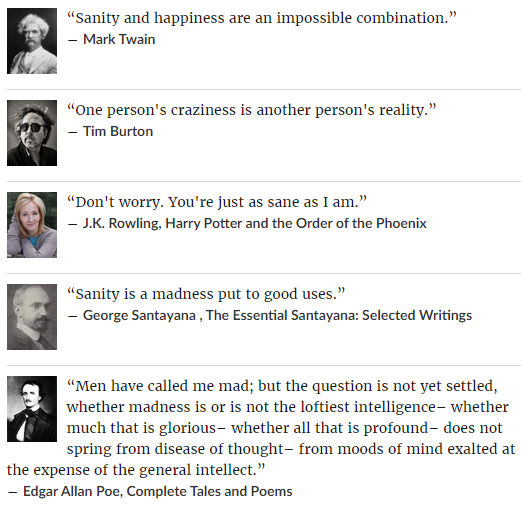
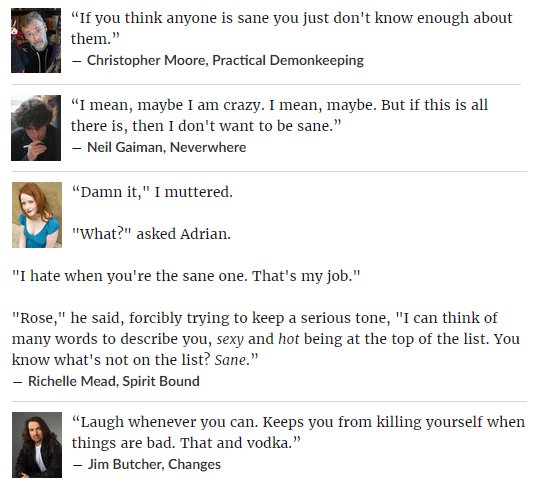
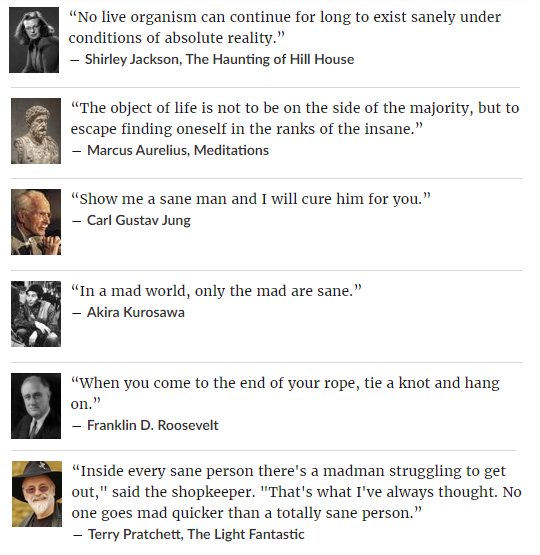
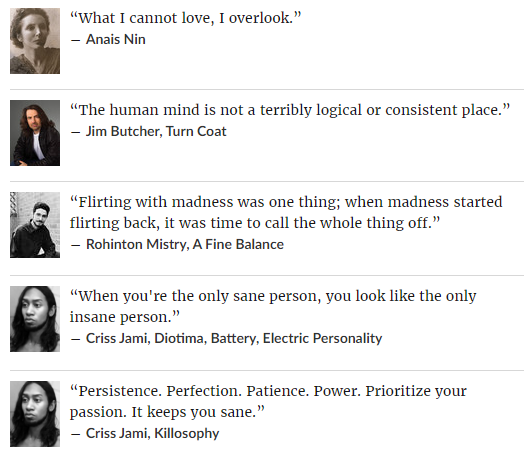

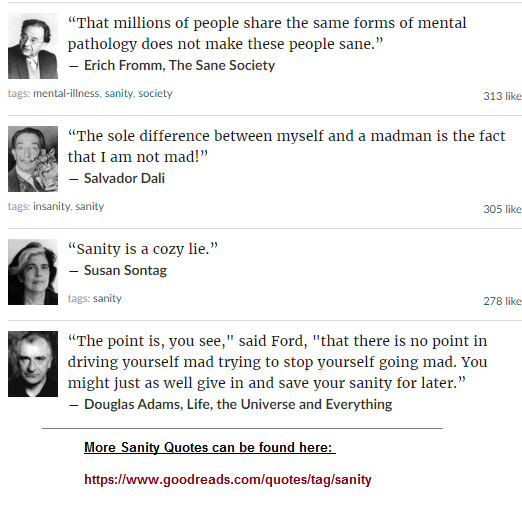
Origination date: Monday, January 13th, 2020... 2:18 AM
Initial Posting: Monday, January 13th, 2020... 1:50 PM
Updated Posting: Wednesday, January 15th, 2020... 5:03 AM
Herb O. Buckland
herbobuckland@hotmail.com